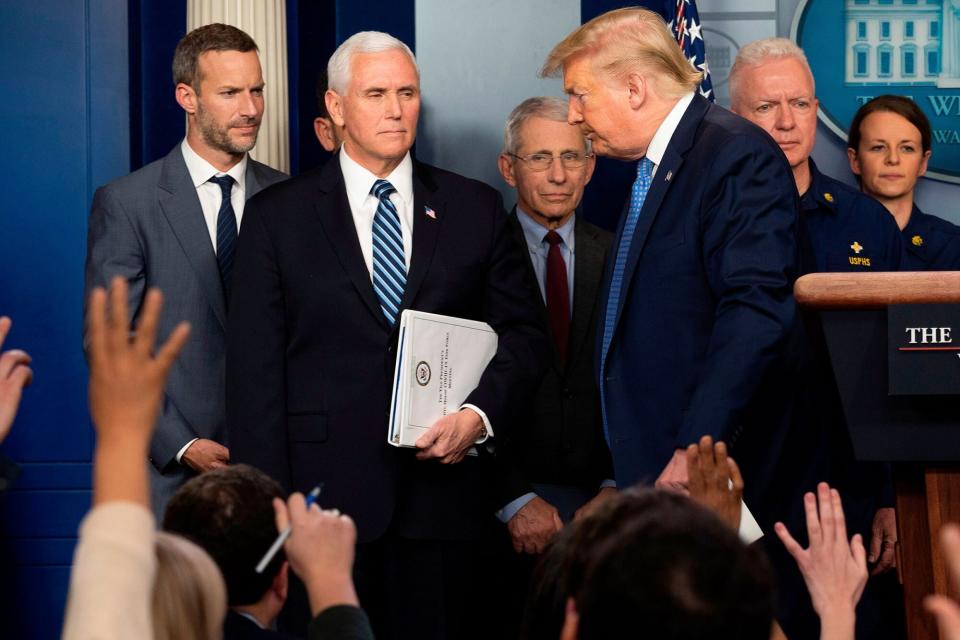Donald Trump Says He Has Talked to Son Barron, 13, About the Coronavirus Pandemic
As information about the coronavirus pandemic rapidly changes, PEOPLE is committed to providing the most recent data in our coverage. Some of the information in this story may have changed after publication. For the latest on COVID-19, readers are encouraged to use online resources from CDC, WHO, and local public health departments and visit our coronavirus hub.
Adopting a markedly different tone about the novel coronavirus pandemic than he has in recent weeks, President Donald Trump said at a news conference on Monday that even he and his son have talked about threat posed by the virus, which will require major social response.
Asked about what he was telling his own family and his “youngest son” about the virus, Trump said, “I’ve spoken actually with my son.” (He did not specify which of his three sons he meant, but only one — Barron Trump, who turns 14 later this week — still lives at home.)
“He says, ‘How bad is this?’ It’s bad, it’s bad,” the president, 73, continued. “But we’re going to be hopefully a best case, not a worst case, and that’s what we’re working for.”
Also on Monday, the Trump administration in conjunction with federal health officials announced even more strict guidelines about what people should do to slow the spread of the new coronavirus, which first emerged in China in December.
The respiratory disease it causes, COVID-19, has killed thousands of people worldwide.
While most people will only experience mild or moderate symptoms, a fraction of patients will suffer severe complications and older age groups and those with pre-existing conditions are at heightened risk.
RELATED: Everything Trump and the White House Have Said About His Own Health amid Coronavirus Pandemic
The White House’s new guidelines said people should now avoid gatherings larger than 10 and should opt for drive-thru, delivery or take-out options instead of going in person to bars, restaurants and other eateries. The White House also said to “avoid discretionary travel” and to avoid facilities for the elderly and critically ill, who are already at increased risk from the virus.
These expand on earlier recommendations about “social distancing” to slow infections: working from home, closing schools and avoiding large gatherings such as concerts and conferences.
The White House guidelines this week noted employees of grocery stores and medical companies should do everything they can to stay healthy and work as normal. Amid increased uncertainty in the public — leading to panic-buying in some areas — the government has insisted that groceries, pharmacies and other essential businesses will remain open.
These recommendations reiterated earlier guidance about maintaining basic hygiene, such as coughing and sneezing into a tissue or your elbow; avoiding touching your face and regularly washing your hands for at least 20 seconds.

AP Photo/Carolyn Kaster From left: Barron Trump with parents Melania and Donald Trump in June 2017
RELATED: Kentucky Man with Coronavirus Who Refused to Self-Quarantine Being Guarded by Police Officer
The president tested negative for the coronavirus, the White House said this weekend. He had come into contact with multiple people who later tested positive.
Vice President Mike Pence has not been tested but said Monday he has no symptoms and was consulting with White House physicians.
“The White House Medical Unit and the United States Secret Service has been working closely with various agencies to ensure every precaution is taken to keep the First & Second Families, and all White House staff healthy,” White House Press Secretary Stephanie Grisham said last week.
The Trump administration’s response to the coronavirus has been under increased scrutiny, particularly with problems in making testing kits from the government widely available. Testing in the U.S. has lagged other countries grappling with their own outbreaks.
The president previously said the virus was being politicized as a “hoax” by Democrats to damage him politically and donwplayed it compared to the seasonal flu — even though experts have repeatedly said the coronavirus is far more dangerous if it is allowed to infect as many people as the flu does.
But on Monday President Trump struck a largely more serious tone, avoiding the confrontational style that has characterized other press conferences. He urged the public to be aware of the risk posed by the virus and be prepared to change their lives for several more months, into the summer, in order to slow the virus’ spread.

JIM WATSON/AFP via Getty Images President Donald Trump (right) on Sunday
Still, he said he was not responsible for the issues with the CDC’s test kits, the rollout of which was hamstrung for weeks by a manufacturing flaw as well as bureaucratic obstacles.
RELATED: Here’s a Map of the Coronavirus Cases in the U.S.
When asked to rate his own response so far, Trump said, “I’d rate it a 10. I think we’ve done a great job.”
As of Monday afternoon, there were about 4,000 confirmed cases of coronavirus in the U.S. and 68 deaths, most of them in Washington state, an epicenter of the outbreak here.
There were about 181,000 confirmed cases worldwide and 7,100 deaths.

